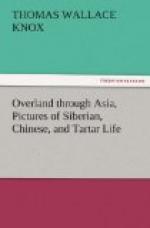From the top of a hill I looked into the wide and beautiful valley of the Nertcha, which enters the Shilka from the north. On its left bank and two or three miles from its mouth is the town of Nerchinsk with five or six thousand inhabitants. Its situation is charming, and to me the view was especially pleasing, as it was the first Russian town where I saw evidences of age and wealth. The domes of its churches glistened in the sunlight that had broken through the fog and warmed the tints of the whole picture. The public buildings and many private residences had an air of solidity. Some of the merchants’ houses would be no discredit to New York or London. The approach from the east is down a hill sloping toward the banks of the Nertcha.
We entered the gateway of Nerchinsk, and after passing some of the chief buildings drove to the house of Mr. Kaporaki, where we were received with open arms. Borasdine and his acquaintance kissed affectionately, and after their greeting ended I was introduced. We unloaded from the tarantass, piled our baggage in the hallway, and dismissed the driver with the borrowed vehicle. Almost before we were out of our wrappings the samovar was steaming, and we sat down to a comforting breakfast, with abundance of tea. And didn’t we enjoy it after riding eight or ten hours over a road that would have shaken skimmilk into butter? You bet we did.
[Illustration: TAIL PIECE]
CHAPTER XXIII.
The heaviest fortunes at Nerchinsk have been made in commerce and gold mining, principally the latter. I met one man reputed to possess three million roubles, and two others who were each put down at over a million. Mr. Kaporaki, our host, was a successful gold miner, if I may judge by what I saw. His dwelling was an edifice somewhat resembling Arlington House, but without its signs of decay. The principal rooms I entered were his library, parlor, and dining-room; the first was neat and cozy, and the second elaborately fitted with furniture from St. Petersburg. Both were hung with pictures and paintings, the former bearing French imprints. His dining-room was in keeping with the rest of the establishment, and I could hardly realize that I was in Siberia, five thousand miles from the Russian capital and nearly half that distance from the Pacific Ocean. The realization was more difficult when our host named a variety of wines ready for our use. Would we take sherry, port, or madiera, or would we prefer Johannisberg, Hockheimer, or Verzenay? Would we try Veuve Cliquot, or Carte d’Or? A box of genuine Havanas stood upon his library table, and received our polite attention. We arrived about ten in the morning, and on consenting to remain till afternoon a half dozen merchants were invited to join us at dinner.
Mr. Kaporaki’s gold mines were on the tributaries of the Nertcha, about a hundred miles away. From his satisfied air in showing specimens and figures I concluded his claims were profitable. The mining season had just closed, and he was footing up his gains and losses for the year. The gold he exhibited was in coarse scales, with occasional nuggets, and closely resembled the product I saw a few months earlier of some washings near Mariposa.




